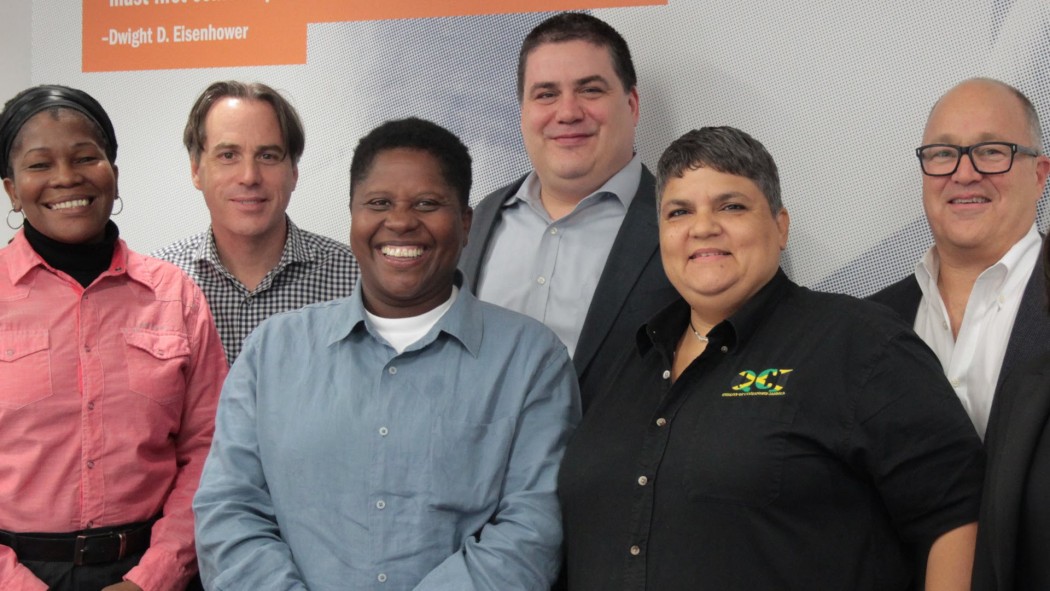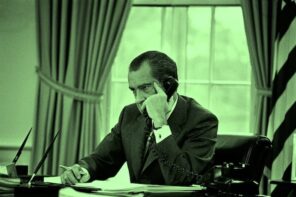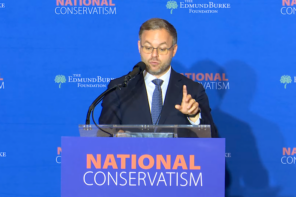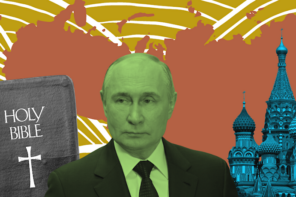PlanetRomeo released a global “Gay Happiness index,” placing Iceland at the top and Uganda at the bottom of 127 rated countries. Last Friday, HBO’s Vice broadcast “A Prayer for Uganda,” a documentary on the harmful impact that American evangelical anti-gay activists like Scott Lively have had in that country.
IDAHOT
Commemorations for International Day Against Homophobia and Transphobia were held on and around May 17. In Chile, more than 50,000 people joined the annual March for Equality last Saturday, and a group of anti-gay evangelicals invaded and disrupted a press conference being held by a gay rights organization.
Activists were reportedly attacked in Kyrgyzstan, where anti-gay violence has been on the rise as the government considers a Russian-style anti-gay “propaganda” law. Reuters reported that Russian police detained 17 people who had gathered for an IDAHOT flashmob balloon release.
Some 50 people assembled on a square outside a Moscow theater but crowd control police drove up a bus and started shoving the protesters inside before they managed to unfurl any banners or chant any slogans….
The LGBT community has come under increased pressure in Russia as President Vladimir Putin has charted a more conservative course since starting his third term in 2012.
A 2013 law against gay “propaganda” sparked an outcry among Russian rights activists and in the West. But partly reflecting the influence of the Orthodox church, many Russians back the law or have negative feelings towards gays.
A similar event took place undisturbed in Russia’s second city of St Petersburg on Sunday, with activists waving rainbow flags and releasing scores of balloons while police looked on.
In the U.S., the White House released a detailed fact sheet on its efforts to make the advancement of LGBT rights a foreign policy priority, and Human Rights First hosted an event featuring several members of Congress and released a new report on advancing LGBT equality in Jamaica.
As we have reported, American religious conservatives have stoked homophobia in Jamaica and rallied resistance to efforts to decriminalize homosexuality. The Human Rights First report takes note of the damaging role played by American evangelical activists like Peter LaBarbera and Judith Reisman:
Dr. Rohan Lewis, dean of the Faculty of Education and Liberal Studies at The University of Technology in Kingston, noted the irony of one of the primary arguments against human rights for the LGBT community in Jamaica: some claim that homosexuality is a North American import, and thus not part of Jamaican tradition and culture. However, American evangelical churches play a strong role in importing and exacerbating homophobia in Jamaica. Lewis explained that since the 1970s, American evangelical churches have become entrenched in Jamaican society and are no longer viewed as outsiders. In contrast, advocacy on behalf of the human rights of LGBT people is seen as a cultural import.
In 2013, the Jamaican Coalition for a Healthy Society and the Lawyers’ Christian Fellowship organized a conference that included outside speakers such as Peter LaBarbera of Americans for the Truth about Homosexuality. LaBarbera, well known in the United States for his strident anti-LGBT activism and support for conversion therapy, stated that ―homosexuals are made, they’re not born, and that ―people are coming out of homosexuality every day. This is the work of God, this is the work of Jesus. LaBarbera is also dismissive about concerns around violence against LGBT people in Jamaica, claiming most violence against LGBT people is committed by other members of the LGBT community….
Dr. Carolyn Gomes of the CVC [Caribbean Vulnerable Communities Coalition] points to the connections between many elected officials and the Christian right, saying that their placement ―in seats of high power‖ is essential to ―maintain[ing] the status quo.‖ The Jamaican Solicitor General as well as the Parliamentary Counsel in the Ministry of Justice are just two of many prominent political figures who are also members of the conservative Lawyers’ Christian Fellowship. In July 2014, in the midst of the review of the Sexual Offenses Act, an estimated 25,000 Jamaicans came together in support of the sodomy law in a protest organized by CAUSE (Churches Action Uniting Society for Emancipation).
The report also says that “some religious figures are engaging constructively on LGBT issues, both through advocacy and through providing services to the LGBT community.” In addition, the report praises U.S. President Barack Obama for calling attention to the work of activist Angeline Jackson during his recent visit to Jamaica, and includes specific recommendations for a number of U.S. agencies to engage in effective partnership with Jamaican government officials and cooperation with human rights advocates in civil society.
Also this week, the State Department confirmed plans for Randy Berry, recently appointed special envoy for LGBT rights, to visit Uganda this summer after trips to the Caribbean, Latin America and Europe.
Watch a set of video interviews on Growing UP LGBT in East Africa, posted at KitschMix.
Ireland: Catholic ‘soul-searching’ on marriage referendum
As we discussed in some detail last week, Irish voters go to the polls today, May 22, in what could be the first national referendum approving marriage equality. Prime Minister Enda Kenny made a televised pitch for a yes vote, and polls show a decisive majority for marriage, but some activists have expressed concerns that a silent group of “no” voters, egged on by the Catholic Church and American anti-gay activists, could result in a surprise at the polls. Several commentators have described the vote as a milestone in the diminishing influence of the Church hierarchy in Ireland; Lester Feder at Buzzfeed reported on priests defying their bishops and publicly supporting a “yes” vote. One priest described it as “a battle going on within the Irish Catholic Church at the moment.” He told BuzzFeed, “There’s a group of us, we try to still hold on to the belief that Catholicism is compatible with modernity … [while] the church is dying at [the bishops’] feet.”
In a sign of how deep this disagreement may run within the Irish church, it is possible that hundreds of Irish priests could vote Yes on Friday, based on the internal discussion of the left-leaning Association of Catholic Priests. The group was formed in 2010 out of frustration with the bishops’ handling of child sex abuse allegations, and now has 1,070 members — around one-third of the country’s priests, according to one of its organizers, Father Brendan Hoban.
When the Association asked its members what position to take on the referendum, Hoban told BuzzFeed News, the group “split down the middle,” so it decided to take no public stand. The group’s founder, Tony Flannery — a priest who was suspended by the Vatican in 2012 for challenging the church’s historical legitimacy and advocating positions like the ordination of women — told BuzzFeed News he thought around 25% of the country’s clergy might yet cast a Yes vote.
Shawn Pogatchnik at Associate Press also examined Catholic soul-searching in advance of the vote:
The campaign ahead of Friday’s constitutional referendum has featured searing testimonies designed to make the voters of this predominantly Roman Catholic nation look in the mirror. Members of many of Ireland’s most prominent families have come out of the closet in hopes of challenging their neighbors’ attitudes to homosexuality. The contest has pit the waning power of the Catholic Church against the secular-minded government of Prime Minister Enda Kenny.
Reuters’ Padraic Halpin reported that “chastened” Catholic Church leaders were taking a back seat in the referendum, noting a stark contrast with the high-profile role the Church played in France in 2013 where it helped organize huge anti-marriage-equality protests.
Despite changing attitudes, the Church still retains more power in Ireland than most places in Europe. Having run many of Ireland’s social services in the 20th century, most schools are still under its control and almost two-thirds of marriage ceremonies are celebrated in Catholic churches.
While the number of Irish people who describe themselves as Catholic has fallen slowly to 84 percent, according to the 2011 census, churches began to empty before the abuse scandals and only around one-third attend church weekly.
For the handful of priests who have said they will vote ‘Yes’, the church has missed an opportunity.
“I think on this one, they’re doing themselves a lot of damage by the stand they’re taking,” said Father Tony Flannery, a founder of the reformist Association of Catholic Priests in Ireland group and a supporter of same-sex marriage.
“This referendum in particular is one that is very attractive to the younger generation. For the official Church to be taking such a consistent no line on it, they’re just further alienating a group that has largely left the Church anyway.”
“I would have thought that that was foolish.”
Kenya: Churches, American activists join anti-gay group’s conference
An International Conference of the Family was held in Nairobi on May 15 with the sponsorship and participation of several American anti-gay and anti-reproductive-choice organizations, including the World Congress of Families, Sharon Slater of Family Watch International, and John Eastman of the National Organization for Marriage as well as Kenya’s first lady Margaret Kenyatta, the Evangelical Alliance of Kenya, National Congress of Churches Kenya, and the Kenya Conference of Catholic Bishops. The event was convened by the Kenya Christian Professionals Forum, which says the group came together around provisions in the then-proposed Constitution that they unsuccessfully opposed harm protections for “family, life and religious freedom and social justice.” The group now sees “a need for concerted efforts to influence the implementation of the constitution with special focus on family, life, religious freedom and social justice issues that are contrary to Christian values.”
The group’s “justification” for the conference:
Recent developments in the legal and social environment threaten the very survival of the Kenyan society. The Christian church remains the only institution that has the answers to these issues. However, church leadership has often been left to grapple with issues that they had no expertise. The campaign for the referendum on the new constitution provided an opportunity for professionals to provide support and take part in formulating the Christian position on issues that the Christian Church felt ought to be dealt with before the passing of the new constitution.
With the eventual passage and promulgation of the new constitution, the church is left with a major challenge in fighting for Godly values in the legal-social framework of our society. Christian professionals are critically needed at this juncture.
It is in this context that the Christian professionals from all disciplines and all parts of the country have come together to form an organization that is able to provide the kind of support needed to influence the legal, social and religious environment of society so that it reflects the Kingdom and the Will of God for society.
The key hindrances that are influencing society negatively include:
- Secular media
- Secular civil society
- Lack of value-based approach to governance in private and public arena and especially in the political front
- Humanistic, atheistic and antichristian influence of Kenyan society from well organized and well funded organizations and religious groups
- Inequitable distribution of wealth in Kenya leading to a wide gap between the rich and the poor resulting in social tension.
- Large youth bulge that lacks opportunities in the job market and that is influenced by a value system that worships money at the expense of Godly values of hard work, honesty and integrity.
- These issues are not easy to deal with and the church faces a daunting task as it stands for Godly values in society. Christian professionals are critically needed in supporting the church as it grapples with these issues. KCPF is therefore filling this critical gap in the fight for transformation of society.
Earlier this month the coalition opposed the recent court decision that cited constitutional provisions in allowing LGBT advocacy groups to register as nonprofit organizations.
India: Mother places same-sex matrimonial ad
Padma Iyer, a mother in India, garnered international attention when she placed the first same-sex “matrimonial ad” seeking a husband for her son. Some major papers turned down the ad, but Mumbai tabloid Mid-Day agreed to run it. Same-sex relationships have been illegal since a 2013 high court ruling reinstated a colonial-era sodomy law. Said Iyer, “How are the concerns of a gay child’s parents any different from that of others?”
The Washington Post adds, “Although the matrimonial posting attracted fanfare on social media, one line did draw criticism: Iyer’s mother, who had an arranged marriage, said in the ad that she would prefer an “Iyer” groom for her son, referring to the family’s upper caste.”The son said via twitter that caste or religion isn’t an issue for him, but he would not be open to a non-vegetarian mate. Reports the Post, “Iyer said he has received six inquiries in response to the ad — ‘2 Iyers, two Muslims and a couple of others. Let’s see!'”
France: United Protestant Church OK’s blessings for same-sex marriages
The United Protestant Church in France voted to allow its pastors to bless same-sex marriages, leaving it up to individual pastors and parishes to decide, reports Euronews.com, which says Protestants make up about two percent of the population most of them evangelicals opposed to same-sex marriage.
Northern Ireland: Baker found guilty of discrimination
In the only jurisdiction within the United Kingdom that does not recognize marriage equality, a judge ruled that the Christian-run Ashers bakery had violated anti-discrimination laws by refusing to bake a cake endorsing same-sex marriage.
Scotland: Church of Scotland OK’s gay ministers in civil partnerships
The Church of Scotland delegates voted overwhelmingly to allow congregations to ordain gay ministers who are in civil partnerships. “Supporters said it was time for the church to be inclusive and recognise the ‘mixed economy’ of modern Scotland,” reported the BBC. “Opponents warned that the move was contrary to God’s law, would prove divisive and lead to resignations.”
Israel: ‘Pinkwashing’ and other debates on Israel in LGBT community
In the Forward, author and RD contributor Jay Michaelson addresses activists from both sides of the “pinkwashing” controversy and other divides on Israel from within the LGBT community.
Gambia: US criticized president’s threats; media spotlight on Rubio backer
We reported last week on threats by viciously anti-gay President Yahya Jammeh to slit the throats of gay people. U.S National Security Advisor Susan Rice condemned the statements last Saturday, saying they were part of “an alarming deterioration of the broader human rights situation in The Gambia,” saying, “We are deeply concerned about credible reports of torture, suspicious disappearances — including of two American citizens — and arbitrary detention at the government’s hands.” ThinkProgress reported that Jennifer Jukawski, who co-hosted a fundraiser for presidential candidate Marco Rubio this week, recently served as a registered foreign agent for Gambia as part of a $45,000 per month (plus expenses) contract between the country and BGR Group.
Luxembourg: Openly gay prime minister gets married
Prime Minister Xavier Bettel married his partner Gauthier Destenay at the capital’s town hall last Friday afternoon.
Cuba: Dispatches from the Blade
The Washington Blade’s Michael Lavers has been reporting from Cuba this week.





